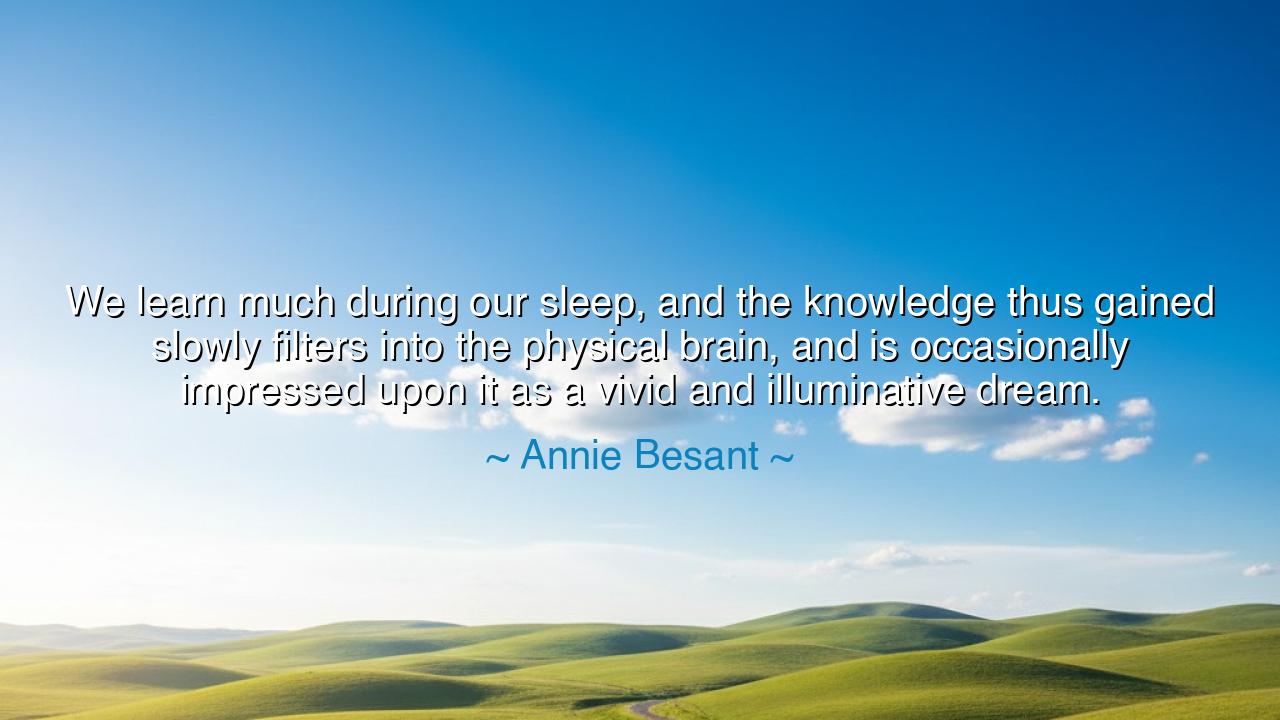
We learn much during our sleep, and the knowledge thus gained
We learn much during our sleep, and the knowledge thus gained slowly filters into the physical brain, and is occasionally impressed upon it as a vivid and illuminative dream.






Hear the words of Annie Besant, a seeker of hidden truths, who spoke thus: “We learn much during our sleep, and the knowledge thus gained slowly filters into the physical brain, and is occasionally impressed upon it as a vivid and illuminative dream.” These words unveil a mystery long pondered by sages and mystics—the mystery of the night hours, when the body lies still but the soul continues its journey. She reminds us that learning is not bound to waking thought alone, for the dream world too is a teacher, whispering wisdom into the depths of the mind.
From the earliest days, humanity has looked to the dream as a doorway to hidden understanding. The Greeks believed that Asklepios, the god of healing, sent remedies to the sick through dreams within his temples. The Hebrews told of Joseph, who interpreted Pharaoh’s dream and thus saved nations from famine. And the philosophers of the East taught that sleep dissolves the veil of the senses, allowing truth to pass into the soul unguarded. Besant’s words belong to this ancient lineage: that the night, far from being idle, is a sacred classroom where the eternal self instructs the mortal mind.
Consider the story of Elias Howe, the inventor of the sewing machine. Struggling with his design, he fell into sleep and dreamt of being attacked by warriors armed with spears that had holes in their tips. When he awoke, he realized that the needle of his machine must be pierced near the point, not at the top. His dream, vivid and strange, gave birth to an invention that clothed the world. This tale gives flesh to Besant’s claim—that what we cannot resolve in waking life may be resolved in dreams, where knowledge filters in unseen ways.
Yet Besant’s insight is not only practical but spiritual. She believed that in sleep, the higher self—the soul beyond the brain—wanders free, touching realms of truth and returning with fragments of wisdom. Sometimes these fragments remain hidden, influencing us silently. At other times, they break through in brilliant dreams that enlighten and inspire. To her, the dream is not mere fancy, but a message from a higher plane of being, impressed upon the mortal mind for its growth.
Her words also carry a lesson of humility: that we are more than we understand ourselves to be. Our waking knowledge, however vast, is only a part of the greater river of consciousness that flows through us. The mind is not an isolated island, but a vessel that receives truths from beyond, especially when the senses fall silent in sleep. To honor our dreams, then, is to honor that larger self which labors for our growth in the hidden hours.
The teaching for us, O listener, is this: attend to your dreams. Do not dismiss them as shadows of chance. Keep a record of them; reflect upon them; ask what wisdom they may carry. For sometimes they will bring practical answers, sometimes warnings, sometimes deep truths about your own heart. Learn also to respect the process of sleep itself, for it is a sacred rhythm through which the soul restores, teaches, and heals the body and the mind.
Thus let Annie Besant’s words endure as a reminder: we are students not only by day, but by night. In dreams the hidden self speaks; in sleep we are taught; through the slow filtering into the brain, wisdom becomes flesh. Let us then live as attentive disciples, grateful for both waking lessons and those carried on the wings of dreams, for in both lies the path to illumination.






AAdministratorAdministrator
Welcome, honored guests. Please leave a comment, we will respond soon